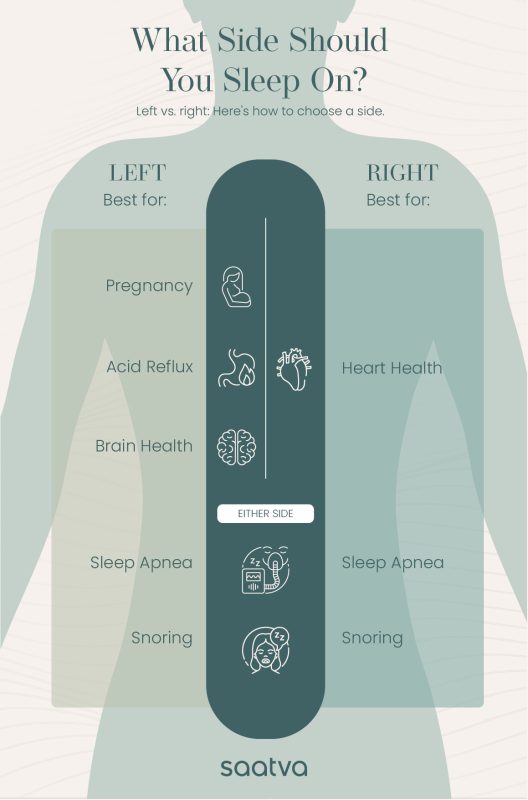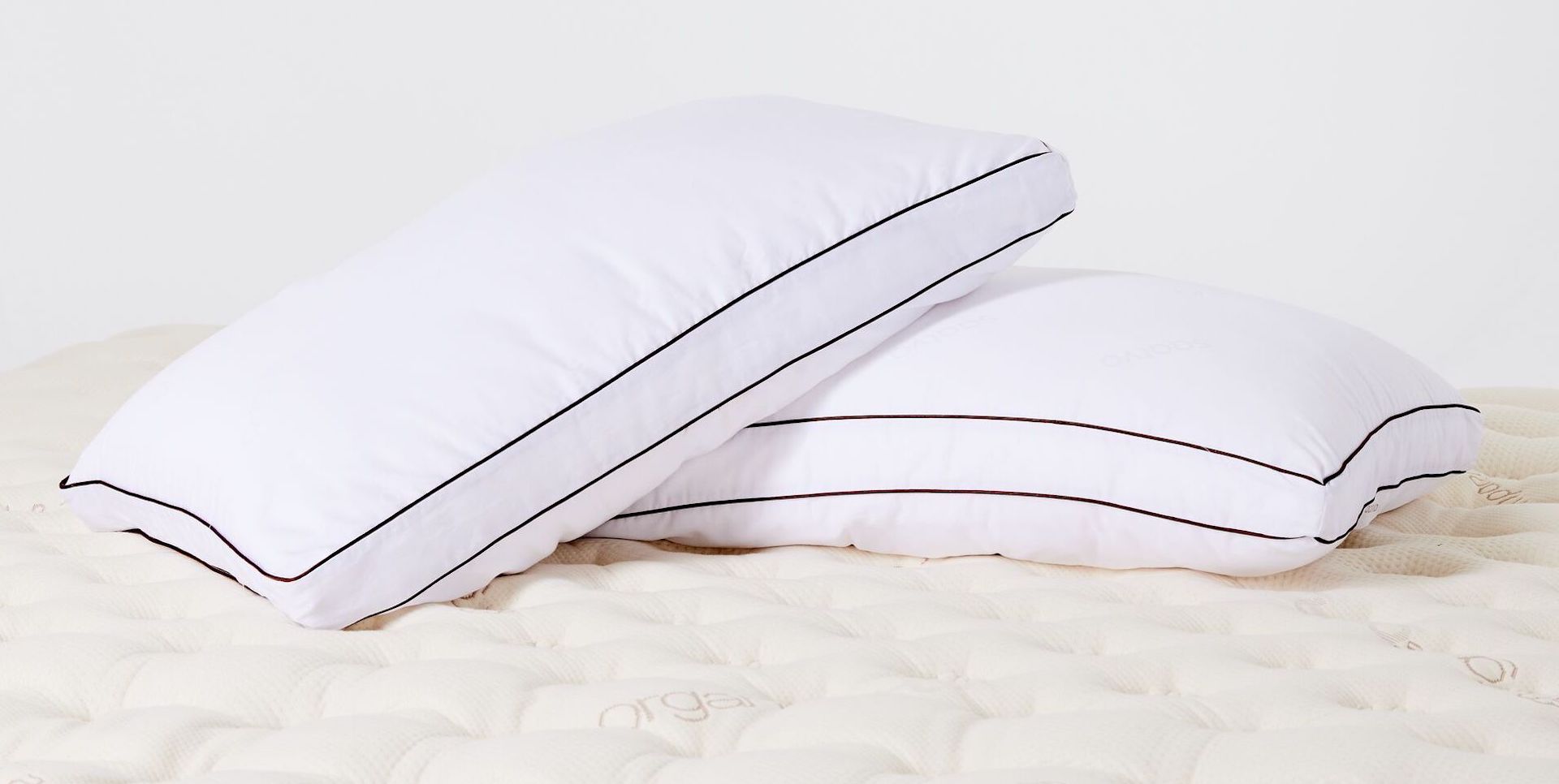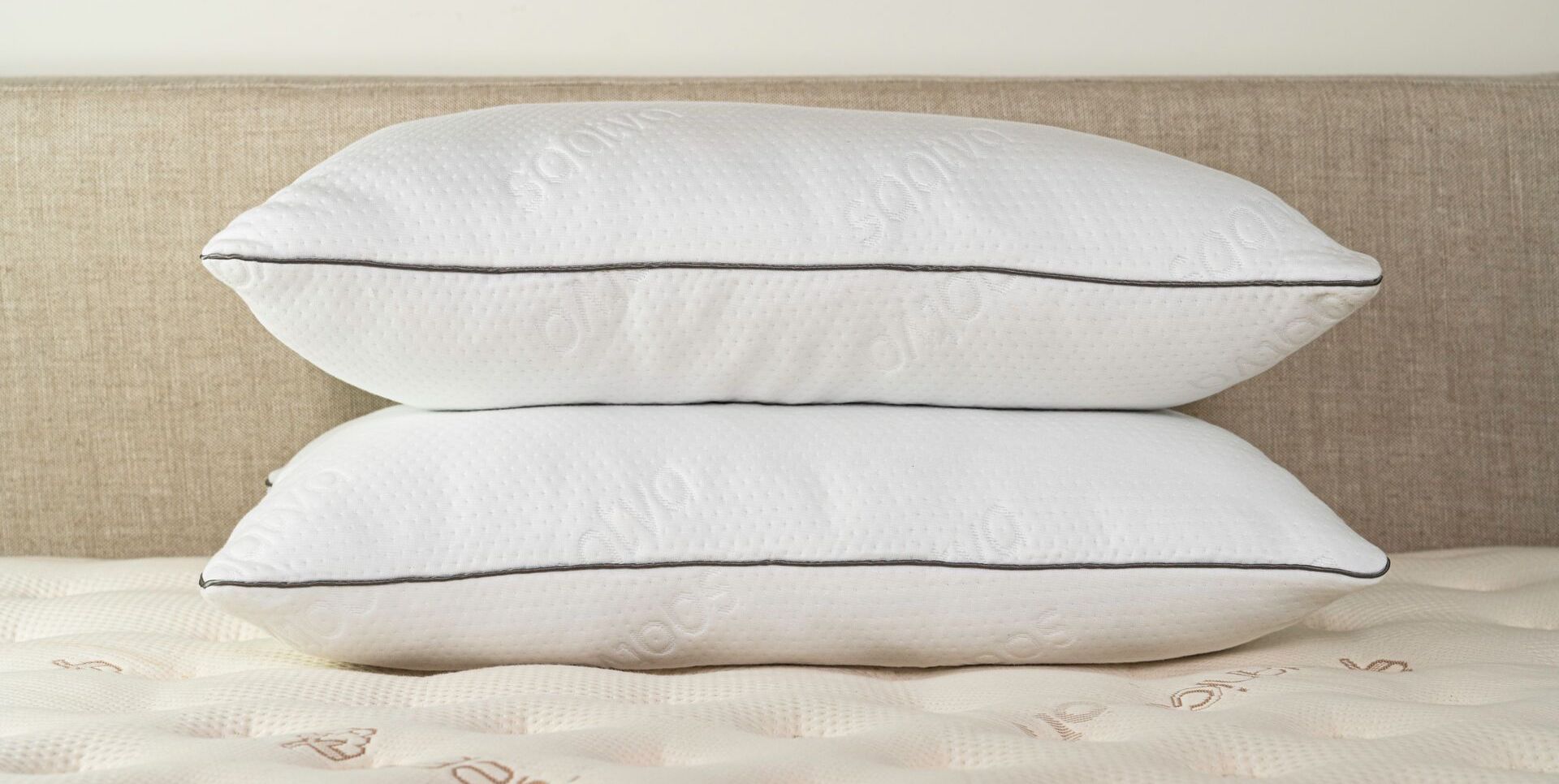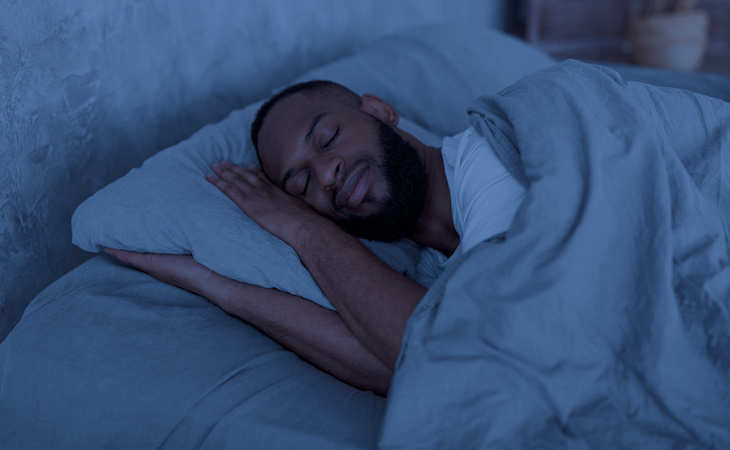You probably don’t spend a lot of time thinking about what position you sleep in. After all, it feels so automatic for many that it likely rarely crosses your mind. But you should know that your sleep position can affect your health—and certain sleep positions can actually benefit a number of health conditions.
Side sleeping wins out as the most popular position—and it turns out it also has some real health benefits. [6] What side is best to sleep on, exactly, though? And when it comes to health issues (like acid reflux), should you choose to sleep on your left or right side?
Ahead, we’ll explore whether there are any benefits to sleeping on your left or right side and when to choose a specific side to sleep on.

Benefits and drawbacks of side sleeping
Side sleeping is the most popular sleep position—and overall, medical experts say this position can be good for your health. [6]
Sleeping on your side can decrease symptoms of acid reflux, ease back and neck pain since the spine is in proper alignment, and improve digestion. [1, 3] It also usually helps people who snore and can reduce sleep apnea symptoms since the airways are more open. [2]
The preference between left or right side sleeping may differ depending on your life stage.
- Pregnant people: During pregnancy, doctors may recommend sleeping on the left side as it can help improve blood flow to the heart. This can be helpful for improving circulation as the pregnancy progresses. [12]
- Older adults: This age group is encouraged to sleep on their ride side for a heart-related concern. Sleeping on the right side helps keep the heart in its ideal position, which is useful for anyone with a heart-related disease. [8]
- Those concerned about brain health: Sleeping on the right side is thought to help clear waste products from the brain more efficiently than other sleeping positions. [13]
What is the best side to sleep on?
Now you’re wondering what side to sleep on. The answer? While sleeping on your right versus your left can support some health conditions, in general, there really isn’t a best side to sleep on, according to Janet O’Mahony, MD, internal medicine specialist at Mercy Medical Center in Baltimore.
What’s more, she points out that it can be next to impossible to “pick” which position to sleep in all throughout the night anyway.
“There is no one position to pick to sleep in,” O’Mahony says. “You can pick which position you start off sleeping in, but you won’t necessarily wake up in that same position.”
Some people try to prop up some pillows so that they can stay on a preferred side all night—but just know that generally, it can be difficult or even unfeasible to truly sleep on the same side all night.
If you do want to stick to a side for health reasons, simply try to catch yourself sleeping on one side and switch to the other if necessary.
Left side sleeping
The left side is best for those who are experiencing certain health conditions.
Pregnancy
People in late pregnancy are encouraged to sleep on the left side because this improves blood flow back to the heart, which the enlarged womb interferes with. In general, left-side sleeping can help improve circulation during pregnancy. [4]
There are a few reasons why pregnant people should try to sleep on their left side as their pregnancy progresses. Not only is sleeping on the left side is better for blood flow to the heart (which is good for circulation as well as for the health of the growing baby’s heart), but it also helps to keep pressure off of kidneys and liver. [1, 12]
It may also help with ailments common in pregnancy, such as swollen ankles, which are due to poor circulation. [12, 14]
A pregnancy pillow may also be helpful for achieving comfortable sleep as the pregnancy progresses.
Acid reflux
People with heartburn are encouraged to sleep on the left side because this can help improve acid reflux. [3] “They are also encouraged to sleep with the height of the bed elevated so gravity will keep the acid out of the esophagus,” O’Mahony adds. [7]
Acid reflux and heartburn can be very uncomfortable and disruptive to sleep. Sleeping on the left side can minimize symptoms and add some relief. Part of the reason why is good old gravity—it keeps whatever’s in your stomach from rising up, which can prevent acid reflux from getting worse. [3]
It’s still a good idea to invest in a wedge pillow to elevate your head and neck. This can help reduce risk of acid reflux while you’re trying to sleep. [7]
Brain health
Brain health is something many of us are concerned about for various reasons. Recent studies show sleeping on your left side can boost your brain health. [13]
Brains have waste too, just like other organs, and draining that waste is important to avoid all sorts of health worries, such as dementia or cognitive decline. Sleeping on your left side can help with that waste removal and keep those toxins from building up in your brain. [13]
Other ways to support your brain while sleeping include treating any underlying sleep issues, sticking to a consistent routine, and prioritizing exercise and a healthy diet. [15]
Right side sleeping
There are some individuals who should lean toward the right side for sleeping.
Heart health
Congestive heart failure patients seem to sleep more on their right side than on their left. [5] “It is unclear why this happens,” O’Mahony says. “It is likely uncomfortable for them to sleep on the left because they can feel their heart beat in their chest stronger if they lie on the left, but no one knows.” If this applies to you and it feels more comfortable to sleep on your right side, consider that a benefit.
Right side sleeping has assorted benefits for heart health, such as reducing pressure on the area and making it easier to breathe. This can help those suffering from heart complications get a more restful night sleep. [5, 8]
It can also prevent symptoms and discomfort from getting worse. Additionally, using a supportive body pillow can be helpful for improving comfort and relieving pressure.
When choosing a side doesn’t matter
Then there are people who have the choice to sleep on either the right or the left side.
Snoring and sleep apnea
O’Mahony says some people with obstructive sleep apnea are encouraged to sleep on either side and not the back because their snoring and apnea can be worse on the back. [2]
Sleeping on your side can help keep your airways open. This is important because when they aren’t open, this can result in inability to breathe and increased snoring. Those with sleep apnea may also have increased acid reflux concerns, and sleeping on your side can help mitigate this as well. [16]
Those with sleep apnea may also want to purchase a wedge pillow as this elevates the head, which also helps keep airways open.
How to become a side sleeper
Since side sleeping is an ideal position for most people—and, in particular, for those dealing with the specific health conditions mentioned above—you may be interested in “training” yourself to become a side sleeper.
Some experts recommend things like propping yourself with pillows, placing your bed against the wall and sleeping facing it, or even sleeping on the couch for a few nights to make it a habit to sleep on your side. But O’Mahony says at the end of the day, people’s bodies will naturally move into varied positions throughout the night.
“Believe it or not, most people spend one-third of the night on their left, one-third on their back, and one-third on their right side,” she says. [11]
But if you’re a chronic snorer who only snores when lying on your back, or if you don’t want to worsen your sleep apnea, it’s a good idea to attempt to sleep on your side. For this, O’Mahony recommends wearing an “anti-snore shirt” to bed.
“This is basically a T-shirt with a pocket or something lumpy sewn onto the back so that when you roll onto your back, it’s uncomfortable, and you roll over onto your side,” she explains.
When to avoid side sleeping
Then there are people who may want to avoid side sleeping. O’Mahony says this includes people with shoulder pain and those with certain joint problems, like hip pain. [6, 9] In these cases, you basically have no choice but to sleep on your back, which is the position that works the best for you.
How to choose the best mattress and pillow for side sleepers
When sleeping on your side—whether left or right—choosing the right pillow and mattress can help provide a more comfortable and supportive sleep.
Mattress
If sleeping on your side, you should seek a medium-soft to medium-firm mattress, such as the

America’s best-selling online luxury innerspring
. [17] This mattress firmness range offers the ideal comfort for shoulder and hip relief.
Pillow
A thicker pillow, such as the

Hotel-quality comfort with responsive & ultra-breathable support
, is ideal. This can help maintain neck and spinal alignment when sleeping on your side. [18] Memory foam pillows, like the

Cooling comfort and contouring support ideal for side sleepers
and

Lofty yet shapeable pillow that contours for weightless support
, can also provide excellent pressure relief for side sleepers.
FAQs
What’s the healthiest position to sleep in?
Back sleeping and side sleeping are thought to be the healthiest positions to sleep in. [6, 10] While both positions have their benefits, it really comes down to choosing the one that feels the best for your needs and aids your individual health conditions.
Why is it good to sleep on your side?
Experts list things like decreased acid reflux, an aligned spine, and improved digestion as pros of sleeping on your side.
Why should you sleep on your left side?
Wondering which side to sleep on if you often have heartburn? Or perhaps you’re pregnant? O’Mahony says the left side can aid these conditions, by either alleviating acid reflux or improving circulation.
Is it bad to sleep on your right side?
It’s not bad to sleep on your right side, but it may worsen symptoms associated with some conditions, such as acid reflux.
Why is sleeping on your left side better?
There are lots of reasons why sleeping on the left side is often recommended. It can be better for circulation and digestion and also help with conditions such as sleep apnea.
Does side sleeping help digestion?
Side sleeping is helpful to digestion largely due to gravity. It helps move the food down and through the intestines so it won’t rise up and cause acid reflux, indigestion, or other related discomforts.
Can sleeping on your side cause shoulder pain?
It’s possible that extended pressure on the shoulder could cause or worsen shoulder pain, but using a supportive mattress and pillow and rotating throughout the night can help with this.
Find the best mattress for side sleepers at Saatva
Saatva offers a wide range of high-quality mattresses that can help side sleepers enjoy comfortable sleep. All of our mattresses come with a 365-night home trial and lifetime warranty. You can take our mattress quiz to discover your perfect match.
References
- Desouzart, G., Matos, R., Melo, F., & Filgueiras, E. (2015). Effects of sleeping position on back pain in physically active seniors: A controlled pilot study. Work (Reading, Mass.), 53(2), 235–240. https://doi.org/10.3233/WOR-152243
- Ravesloot, M. J., van Maanen, J. P., Dun, L., & de Vries, N. (2013). The undervalued potential of positional therapy in position-dependent snoring and obstructive sleep apnea-a review of the literature. Sleep & breathing = Schlaf & Atmung, 17(1), 39–49. https://doi.org/10.1007/s11325-012-0683-5
- Harvard Health. What’s the best sleep position to combat heartburn? https://www.health.harvard.edu/diseases-and-conditions/whats-the-best-sleep-position-to-combat-heartburn
- American College of Obstetricians and Gynecologists. Can I sleep on my back when I’m pregnant? https://www.acog.org/womens-health/experts-and-stories/ask-acog/can-i-sleep-on-my-back-when-im-pregnant
- Bayraktar MF, et al. (2018). Serial echocardiographic changes with different body positions and sleeping side preference in heart failure patients. https://doi.org/10.1111/echo.13888
- Cleveland Clinic. Best Sleeping Positions for Pain. https://health.clevelandclinic.org/best-sleeping-positions-for-pain
- Albarqouni, L., Moynihan, R., Clark, J., Scott, A. M., Duggan, A., & Del Mar, C. (2021). Head of bed elevation to relieve gastroesophageal reflux symptoms: a systematic review. BMC family practice, 22(1), 24. https://doi.org/10.1186/s12875-021-01369-0
- Pan, H., Xu, Z., Yan, H., Gao, Y., Chen, Z., Song, J., & Zhang, Y. (2018). Lying position classification based on ECG waveform and random forest during sleep in healthy people. BioMedical Engineering OnLine, 17, 116. https://doi.org/10.1186/s12938-018-0548-7
- Arthritis Foundation. Hip Pain at Night? https://www.arthritis.org/health-wellness/about-arthritis/understanding-arthritis/causes-and-treatments-for-nighttime-hip-pain
- Sleep Foundation. Best Sleeping Positions. https://www.sleepfoundation.org/sleeping-positions
- Gordon, SJ, Grimmer, KA, Trott, P. (2004). Self-Recorded versus Recorded Sleep Position: An Observational Study. The Internet Journal of Allied Health Sciences and Practice. Volume 2 Number 1. https://nsuworks.nova.edu/cgi/viewcontent.cgi?article=1034&context=ijahsp
- Rossi, A., Cornette, J., Johnson, M. R., Karamermer, Y., Springeling, T., Opic, P., Moelker, A., Krestin, G. P., Steegers, E., Roos-Hesselink, J., & van Geuns, R. J. (2011). Quantitative cardiovascular magnetic resonance in pregnant women: cross-sectional analysis of physiological parameters throughout pregnancy and the impact of the supine position. Journal of cardiovascular magnetic resonance : official journal of the Society for Cardiovascular Magnetic Resonance, 13(1), 31. https://doi.org/10.1186/1532-429X-13-31
- Hedok Lee, Lulu Xie, Mei Yu, Hongyi Kang, Tian Feng, Rashid Deane, Jean Logan, Maiken Nedergaard and Helene Benveniste. Journal of Neuroscience 5 August 2015, 35 (31) 11034-11044; https://doi.org/10.1523/JNEUROSCI.1625-15.2015
- Cleveland Clinic. Varicose Veins While Pregnant. https://my.clevelandclinic.org/health/diseases/23331-varicose-veins-in-pregnancy
- National Institute on Aging. Cognitive Health and Older Adults. https://www.nia.nih.gov/health/brain-health/cognitive-health-and-older-adults
- Mahfouz, R., Barchuk, A., Obeidat, A. E., Mansour, M. M., Hernandez, D., Darweesh, M., Aldiabat, M., Al-Khateeb, M. H., Yusuf, M. H., & Aljabiri, Y. (2022). The Relationship Between Obstructive Sleep Apnea (OSA) and Gastroesophageal Reflux Disease (GERD) in Inpatient Settings: A Nationwide Study. Cureus, 14(3), e22810. https://doi.org/10.7759/cureus.22810
- Caggiari, G., Talesa, G. R., Toro, G., Jannelli, E., Monteleone, G., & Puddu, L. (2021). What type of mattress should be chosen to avoid back pain and improve sleep quality? Review of the literature. Journal of Orthopaedics and Traumatology : Official Journal of the Italian Society of Orthopaedics and Traumatology, 22, 51. https://doi.org/10.1186/s10195-021-00616-5
- Radwan, A., Ashton, N., Gates, T., Kilmer, A., & VanFleet, M. (2021). Effect of different pillow designs on promoting sleep comfort, quality, & spinal alignment: A systematic review. European Journal of Integrative Medicine, 42, 101269. https://doi.org/10.1016/j.eujim.2020.101269













